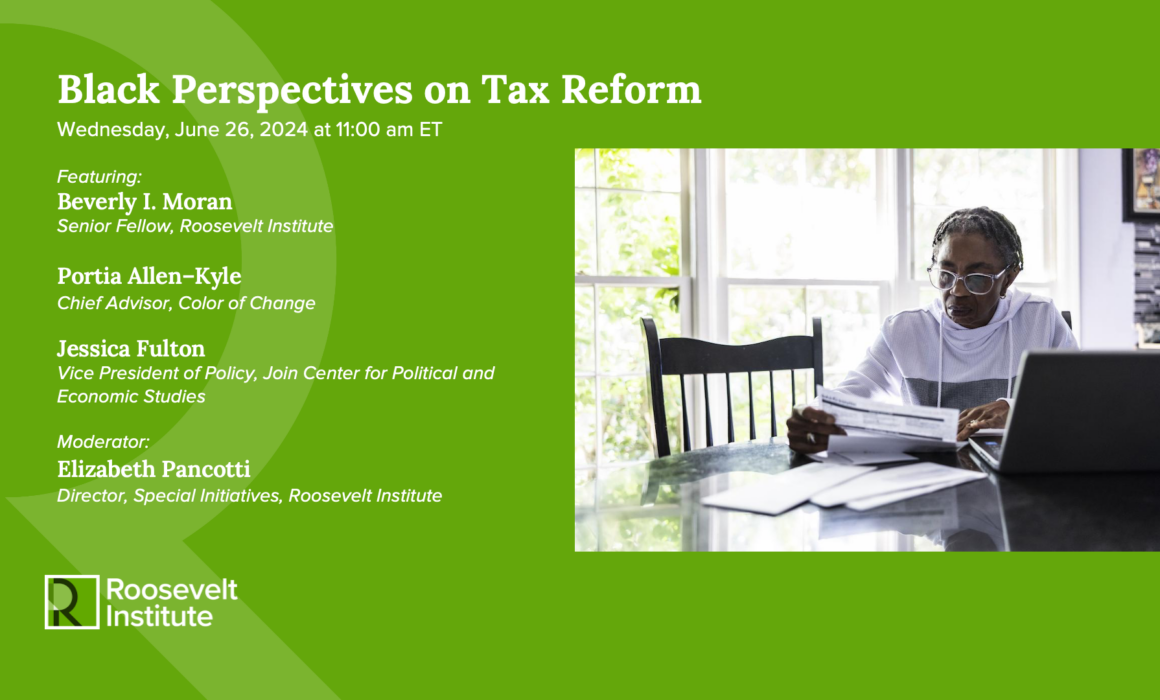Trickle-down economics has wreaked havoc on our federal tax code for the better part of the past 50 years. Tax cuts tilted toward corporations and the wealthy have exacerbated economic and racial inequality. The tax reform debate is heating up as we near expirations of key provisions of the Tax Cuts and Jobs Act (TCJA), and federal policymakers have the opportunity to use the tax code to rebalance economic power and center racial equity. Lawmakers can go beyond tinkering with extending or sunsetting TCJA provisions and confront the tax code’s long-standing provisions that harm Black taxpayers and exacerbate inequality.
On June 26, 2024 the Roosevelt Institute hosted a discussion that brought together experts to discuss the effects of the TCJA on Black Americans and how tax reform can reduce economic and racial inequality. Roosevelt Institute Senior Fellow Beverly Moran will discussed her upcoming report exploring the TCJA’s impact on Black Americans and was joined by Jessica Fulton from the Joint Center for Political and Economic Studies and Portia Allen-Kyle from Color of Change to evaluate the failures of the TCJA and preview how a more equitable tax code can work for all Americans.
In Conversation
Beverly I. Moran
Senior Fellow, Roosevelt InstituteAs a senior fellow at the Roosevelt Institute, Beverly I. Moran focuses her research on US federal tax policies and how they support or thwart the American dream. Beverly is professor emerita at Vanderbilt University, where she arrived after her tenure as the Voss Bascom Professor of Law at the University of Wisconsin at Madison.
A leading authority on US tax law, Beverly has testified before the House Ways and Means Committee on the proliferation of US tax havens and the Black Congressional Caucus on the race impacts of the Internal Revenue Code. Her work is extensively cited in the recent Treasury report on the race aspects of US tax laws. Beverly has published seminal articles over her long academic career, including “Capitalism and the Tax System: A Search for Social Justice,” “A Black Critique of the Internal Revenue Code,” “Revisiting the Work We Know So Little About: Race, Wealth, Privilege, and Social Justice,” and “Race and Wealth Disparity: The Role of Law And The Legal System.”
Beverly is currently conducting research on the impact of Social Security and other retirement plans, as well as other interdisciplinary topics related to US tax law. Her work has often touched on international issues. At Vanderbilt, she directed the Center on the Americas, an interdisciplinary research center. At the University of Wisconsin, she founded and administered the University of Wisconsin Center on Law and Africa. Beverly holds a master of law degree (LLM) in taxation from New York University School of Law, a JD from the University of Pennsylvania, Carey School of Law, and an AB from Vassar College.
Portia Allen-Kyle
Chief Advisor, Color of ChangePortia Allen-Kyle is a trusted advisor and cross-functional leader with a track record of advancing equity across external programs and internal operations in nonprofit, government, and academic settings. She currently serves as the Chief of Staff and Interim Head of External Affairs at Color Of Change, a digital-first organization leveraging campaigns, organizing, and narrative pressure against government and corporations to act on racial justice and civil rights. In this capacity, she leads the organization’s strategic advocacy, including campaigns in support of IRS Direct File and tax justice as a means to address the racial wealth gap for Black families.
Previously, Portia was a Biden Administration appointee in the role of Senior Advisor for equity, policy, and stakeholder engagement in the Office of Civil Rights at U.S. Department of Transportation. In that capacity, she served as a thought partner and advisor to the agency’s senior leadership developing and implementing change management strategies to transform policies and practices to embed equity into the safety mission. For over 15 years Portia has spent her career advancing civil rights and civil liberties through a race equity lens by building and supporting coalitions, implementing legislative and stakeholder engagement strategies, and crafting innovative policy reports and solutions.
Jessica Fulton
Vice President of Policy, Joint Center for Political and Economic StudiesJessica Fulton is the vice president of Policy at the Joint Center for Political and Economic Studies. An expert on issues at the intersection of race and economic policy, Jessica’s work focuses on identifying and promoting policies to advance the socioeconomic status of the Black community. In her current role, she oversees the Joint Center’s research and policy team and leads Economic Policy research.
Before joining the Joint Center, she served as external relations director at the Washington Center for Equitable Growth, where she worked with scholars to advance policymaker understanding of the connection between economic inequality and economic growth. She has also held local research and advocacy positions at the DC Fiscal Policy Institute and the Chicago Urban League.
Jessica is a member of Delta Sigma Theta Sorority, Inc. She serves on the Board of The Black Swan Academy, an organization focused on increasing civic engagement among Black youth, and the Advisory Board of the Sadie Collective, which strives to increase the representation of Black women in economics. Jessica earned a bachelor’s degree in Economics from the University of Chicago and a master’s degree in Economic Policy Analysis from the Kellstadt Graduate School of Business at Depaul University.

Elizabeth Pancotti
Director, Special Initiatives, Roosevelt Institute [Moderator]As the director of special initiatives, Liz works across the program areas of the think tank to strategically drive the research and policy agenda. Liz also leads Roosevelt’s tax policy work. Prior to Roosevelt, she was an advisor to Sen. Bernie Sanders (I-VT), serving as the labor policy director of the US Senate Committee on Health, Education, Labor, and Pensions and as a senior budget analyst on the Senate Budget Committee. She played a key role in the industrial policy and labor provisions of the Inflation Reduction Act. Before the Senate, she was the policy director at Employ America where she focused on unemployment insurance benefits during the COVID-19 pandemic. Liz’s work has been featured in the New York Times, the Washington Post, and The Guardian.





